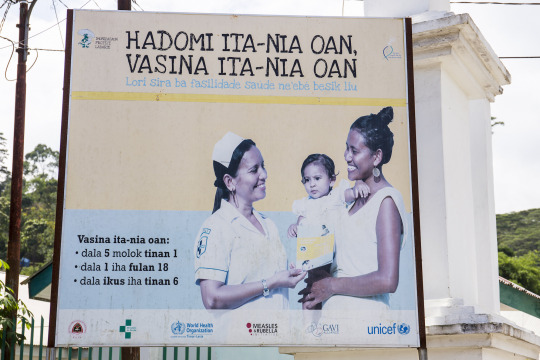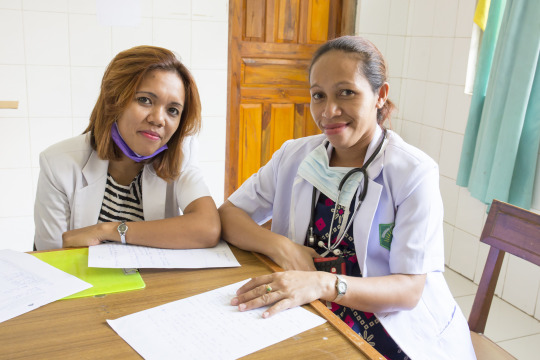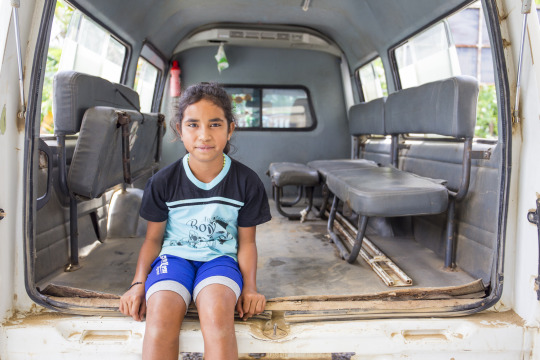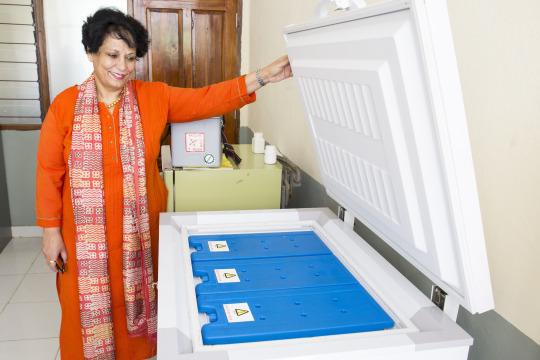Anuradha Gupta, Deputy CEO of Gavi, the Vaccine Alliance
It is seven o’clock in the morning, and as the cool night gives way to the heat of the day, a winding road stretches ahead of us towards the town of Gleno in Ermera province. On our way, we’re treated to unparalleled views of the jungle and the ocean.
Timor-Leste is a very young country, which is still recovering from the trauma of protracted conflict. When it became independent in 2002, most of the nation’s infrastructure had been completely destroyed, and as we travel towards Gleno, I cannot help but compare Timor to a phoenix rising from the ashes.
As far as immunisation is concerned, the country is definitely making strides. It is heartening to see the recent census data, which indicates that 90% of children in Timor-Leste have received a third dose of the pentavalent (5-in-1) vaccine, and 84% have been immunised with all vaccines in the national immunisation schedule. It is a remarkable achievement and a sign that Timor-Leste is investing in its primary health care and expanding the network of health facilities to ensure the increased availability of health workforce and services to communities, many of whom live in hard-to-reach areas.

A billboard advertising the benefits of vaccination outside Gleno Health Centre. Photo: Gavi/ A. Hellin.
The country is now working on building up its human resources through various innovative approaches, and is constantly looking for ways to strengthen their capacity. The one I particularly liked is the cooperation with the Cuban Government. One thousand Timorese doctors have been trained in Cuba and continue their training through the ’Cuban Brigade’ in Timor. The ‘Brigade’ comprises 150 full-time doctors from Cuba, who double-up as both trainers and service providers, and whose number is progressively declining as Timor prepares its own homegrown network of health providers.
In parallel, Timor-Leste has designed four-year courses for nurses and midwives to not only increase their availability for local communities, but also ensure service standards. These measures have helped increase the ratio of available professional staff in the health sector from 3.4 (2012) to 18.4 (2015). The ratio continues to improve – an impressive achievement for a post-conflict fragile country.

Two medics working at the clinic. Photo: Gavi/ A. Hellin.
Having created this critical mass of human resources for health, the country has recently embarked on ‘Saude Familial’, a platform which focuses on an integrated approach to free primary health care through public health system strengthening. It was a delight to meet a team of doctors in a community health centre in Ermera. These young dynamic health professionals oversee almost 10,000 families in remote communities outside of Gleno, each of whom they visit in person together with a team of midwives and nurses for screening, on-the-spot services, referral and regular follow-up. The digital database of each family and their health status, which has also been created, is a key tool to ensure systematic follow-up and monitoring. It was amazing to see firsthand how long neglected cases of mental illness, physical disability and several other diseases, which families have accepted as their fate, are now being detected and treated. This approach is exactly what the country needs and will help focus on preventive and promotive aspects of healthcare, sadly neglected in many other countries. Today, there is stronger hope that the 16% of children currently deprived of a full course of basic vaccines will soon be reached.

A girl waits outside the health centre. Photo: Gavi/ A. Hellin.
Of course, challenges remain. Many will argue that Timor-Leste’s domestic investment in healthcare remains fairly low with only 1.3% of GDP allocated to health. As Deputy CEO of Gavi, I too would argue for a step-up in health budget. However, in a country like Timor-Leste, this must go hand-in-hand with investment in basic infrastructure, such as roads, power and water, all of which indisputably improve community access to education, healthcare and other services so critical to human development.
On our way to Gleno, we see children making use of the paved road as they walk to school and health teams accessing previously difficult to reach communities. In a bid to take healthcare closer to communities, 100 new health posts have been added thanks to the availability of electricity. This has also helped Gavi support the expansion of cold chain equipment and is sure to reduce inequities in healthcare access. We also observed persistent challenges of lack of clean drinking water. Given the exceptionally high levels of malnutrition in Timor-Leste, investments in improving access to safe drinking water are badly needed, especially to reduce the risk of diarrhoea and pneumonia, two of the biggest child killers in the country.

The author inspects the clinic’s cold chain facilities. Photo: Gavi/ A. Hellin.
From my discussions with Government officials, I know the Timorese understand the importance of prioritising investment in healthcare with foundational focus on immunisation. But it is a gradual process, and given that the country’s health budget actually doubled in the past year, I believe Timor-Leste has come a long way.
It was so heartwarming to see the impetus that Gavi support has been able to build.. With Gavi’s contribution,pentavalent vaccine has been introduced nationally and now protects 90% of children against deadly diphtheria, pertussis, tetanus, Haemophilus influenzae type b (Hib) and hepatitis B. The tailoring and flexibility that Gavi encourages has helped strengthen health systems. In particular, it has helped provide all health facilities, both old and new, with modern cold chain equipment. Gavi’s catalytic investments in data strengthening have also started to show impact.
At the end of my four-day visit, I leave Timor-Leste with an impression that here is the example of a country, which is only 14 years old, but is proud, determined and eager to forge ahead. I am profoundly moved by the impact that Gavi and its partners have been able to make in the midst of myriad challenges.






